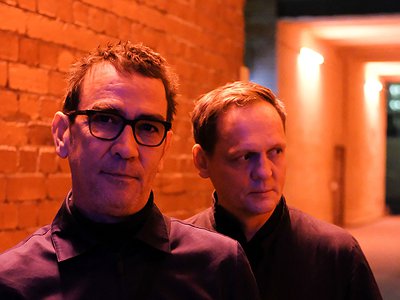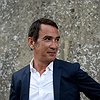Could you describe your creative process on the basis of a story, poem or novel that's particularly dear to you, please? Where did the ideas come from, how were they transformed in your mind, what did you start with and how did you refine these beginnings into the finished work of art?
I will take as example my forthcoming book, "Life and Death of the Man Who Killed John F. Kennedy.” It’s a biography of Lee Harvey Oswald. I retrieved all of the transcripts of the witnesses who had been investigated by the Warren Commission.
I took into account witnesses who knew Oswald and consulted 270 testimonials and more than 10,000 pages of transcripts. I re-wrote Oswald's life retrieving all the information I could find in these testimonials. This book is also a research on the formats of storytelling, document/fiction report and on how a historical event can change in its nature with the passing of time. If at first glance what looks like a classical biography, is going to gradually change over its course by letting re-surface the nature of the documents used. The Warren Commission transcripts are a series of questions and answers and following this logic the book will shine this aspect through the pages: the witnesses speak directly, “he/she" of the third person’s narration suddenly becomes an “I”, as in a direct speech.
Then long sequences of dialogues come along - the same sentences the witnesses uttered during a meeting with Oswald. Blocks of stories are increasingly interrupted by these conversations. The last part of the book takes the form of a theatre dialogue between Oswald and the police commissioner who interrogates him.
At all stages of this writing documents are the only source. And yet they will appear in various forms and rise different impact on the reader - it can go as far as a crime novel or a play.
Observation and research are often quoted as important elements of the writing process. Can you tell us a bit about your perspective on them?
Research is fundamental to my work. Every text and writing is always backed up by a document. My intention is to arrange and present it in a way that could be part of a literatary expression. I imagine the ways and patterns in which a facts-oriented, and concrete document can flow. At the end of every work I realize how a technical document can sound poetic or convey an effect of fiction. By simply reversing the word order of a sentence like an advertising phrase or a complex law article, you can get something new - it’s surprising.
How do you see the relationship between conscious planning and tapping into the subconscious; between improvisation and composition? When dealing with the end of a story, for example, do you tend to minutely map it out or follow the logic of the narrative as it unfolds itself?
The literary forms arising from a document comes less from my unconscious than the writing. I would say it’s more part of a “collective unconsciousness” because the document is "already written" – it is first of all property of a community. For example, I can use my habit of collecting cash receipts to compose a short story of a day:
Jeudi 19 mars 2009
Evénement n°21
1 ticket “ticket t+ optile ratp — bus t m rer dans paris t sncf — carnet — stif stif stif — 005676486i 0803 b 14” ; 1 paquet de cigarettes “classic red – Chesterfield – Fumer peut entraîner une mort lente et douloureuse – les mineurs ne doivent pas fumer - made in the eu under authority of philip morris products s.a. neuchâtel switzerland” ; 1 lettre “EUROPEENNE D ENVOIS — BP 28 — 68250 — DESTINE0 MD7 — LA POSTE — 68 SCCE-A CI 0462 — DEPOSE LE 17/03/09 — m62 0024 402 0040133 00427t 2 — M. ANNE JAMES CHATON — CHEZ VALERIA GIUGA — 1 RUE DU RETRAIT — 75020 PARIS” ; 1 ticket “BAR DU METRO — 10 place gambetta — 75020 paris — tel.01.46.36.95.10 — JEU 19 MAR 2009 16 :34 — 1 café serré 2.50 2.50 — TOTAL 2.50 — 1 total 2.50 — tva 19.60% 0.49 — ht 2.01 — CHEQUE NON ACCEPTE — merci de votre visite — prix nets service 15% compris — ticket 173 — nelly” ; 1 ticket “ticket t+ optile ratp — bus t m rer dans paris t sncf — carnet — stif stif stif — 005676486j 0803 b 14” ; 1 sachet “www.festivaldespains.com — stiv des va pain Festiv des des pains pains val Festival des pains— A chaque baguette sa saveur ! — découvrez dans ma boulangerie une large gamme de baguettes originales. a déguster sans modération!”.
It's a kind of brief autobiography but it's also a social universe that emerges.
An additional example could be codes that police cars use to share information:
«10-23 ARRIVED AT THE SCENE
10-12 STANDBY
10-38 CHECKING A CAR
10-37 SUSPECTED CAR
10-14 SUSPECTED PERSON
10-30 NOT COMPLYING WITH THE RULES
10-64 TOPIC WANTED »
The code pre-exists but the context in which I write it and the order in which I organize its parts generates a fictional effect that takes it off its contextual meaning and shines a different aura in a literary space.
There are many descriptions of the ideal state of mind for being creative. What is it like for you? What supports this ideal state of mind and what are distractions? Are there strategies to enter into this state more easily?
My strategy is to have several books to write. In the morning, when I get to work, I choose the book to move along with according to my mood - the one that gives me the most pleasure at that moment and I move on to another book if after 2/3 hours I feel I need a new source of inspiration, or simply switch to another project.
My writing work evolves by its forms: it can be a book but can also involve sounds and visuals. If one morning I do not feel like writing, I work on sounds, and if it does not suit me I move to a visual work. The advantage is that these different forms feed on each other. A writing idea can generate a breakthrough for a text; a sound composition can give me an idea for a visual work. Distraction serves me as a source for me to be constantly moving between these different forms of writing.
What are the most important conclusions you've drawn from the changes in the publishing landscape? How do they affect your writing? What role do social media play for your approach?
I was not really upset by the changes in the publishing landscape because I have always navigated between different media. My first books were accompanied by CDs. New media represent new opportunities for publications and simultaneously the constraints of purely textual formats. As a result, I see the combination of textual and visual subjects as being appropriate to Facebook or Instagram.
How do you work with sense impressions in your writing? From your experience, what are some of the most inspiring overlaps between different senses - and what do they tell us about the way our senses work?
I have a truly objectivist approach to art in general, and literature in particular. I consider that by deploying the minimum of sensibility in my work I’m giving more opportunity to the reader, the spectator, the person who receives the work, to play with his/her own senses. In short, "the less I am in the work, the more can be expressed.”
Art can be a purpose in its own right, but it can also directly feed back into everyday life, take on a social and political role and lead to more engagement. Can you describe your approach to art and being an artist?
The first question I asked myself when I started writing was this one: what are the texts that everyone reads? What are the writings we all share, regardless of our social status, level of education, or relationship to books and literature?
For me, the cash receipts are a good example. Everyone comes across them throughout their existence. It is a form of writing and I decided to work with this form of “popular” text. As soon as you touch language you end up being political in some ways - you manipulate the basic form on which communities are built and develop a sense of togetherness.
It is remarkable, in a way, that we have arrived in the 21st century with the basic concept of writing and storytelling still intact. Do you have a vision of literature, an idea of what it could be beyond its current form?
I do not have a vision because that would imply that I want to impose on the future form of literature. Literature invents itself, its own future, and writers are the means.



